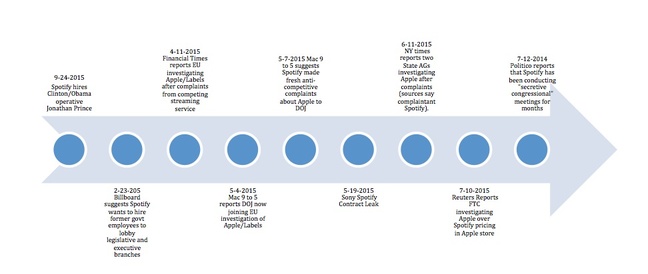This article is more than 1 year old
Hey, Spotify! Why do you internet companies hate competition?
Songwriters aren't asking Uncle Sam for help. So why are you?
Guest opinion Last year Spotify hired a former political strategist in the Obama administration and some of Pandora’s lobbyists to protect its untenable and money-losing business model. I predict that the end goal of these efforts will leave artists and songwriters worse off.
The ex-Obama hand is called Jonathan Prince. Spotify’s lobbying activities appear to have three goals:
- Protect Spotify's free streaming tier (which pays artists one seventh of what the premium subscription service pays). This tier makes Spotify more valuable at IPO or a tasty takeover target to an advertising-driven company like Google.
- Get music rival Apple under some kind of anti-competitive regulation in Europe and the US, and under state attorneys general.
- Get rights-holders of sound recordings (artists and record labels) under some sort of anti-competitive regulation in Europe and the US states, so that they are obligated to license sound recordings to Spotify outside of the free market (like the ASCAP and BMI rate courts).

A timeline of Spotify's lobbying efforts with the EU, state attorneys general, the executive branch of the US government, the US Department of Justice, US watchdog the FTC and US Congress since hiring a former Obama/Clinton administration strategist. [Click to enlarge]
Yes, we were disappointed with Apple’s initial attempt to not pay artists during a 90-day free trial of its new music-streaming service, although the iPhone giant has since changed its tune. The fact is Apple is still better than Spotify for artists in several ways:
- Apple's free trial pays about $0.002 a spin, while the last time we checked Spotify pays about $0.0009 per spin on their ad-supported free tier. (Online advertising rates have experienced a decline since then.)
- Apple's free trial lasts three months. Spotify's free tier is forever. After three months, Apple's streaming listeners move up to the paid-for subscription tier. We expect Apple’s subscription tier to pay more than the Spotify subscription tier, so this means a significant increase in revenue per spin to artists. Plus: we don’t have to go through the absurd revenue share calculation of the advertising peddlers.
- Spotify is actively trying to get users to unsubscribe from its premium service offered through the Apple App Store (and the 30-per-cent cut Apple takes), which will likely mean an overall net reduction in revenue to artists because it inserts inconvenience into the transaction. Apple is actively trying to encourage a subscription uptake, which will mean an overall net gain in revenue to artists.
Artists have an interest in seeing a competitive marketplace for streaming services that isn’t dominated by the duopoly of YouTube and Spotify. According to journalist Kara Swisher:
Omid Kordestani, who has just temporarily replaced Nikesh Arora as chief business officer of Google, is joining the board of Spotify, according to people with knowledge of the situation. In addition, sources said, one of the search giant’s former execs, Shishir Mehrotra, will become a special adviser to CEO Daniel Ek and the company’s management. The move is a fascinating one, especially since sources inside Google said that new YouTube head Susan Wojcicki has expressed interest in acquiring the popular online music service if it were for sale.
YouTube and Spotify already share a board member. Every quarter, when artists get their royalty statements, they have tangible evidence of the damage created by this duopoly.
Here is the kicker. We should welcome investigations by the European Commission, state attorneys general, US Congress and the US DoJ into anticompetitive behavior and collusion in the digital music licensing marketplace for sound recordings. But it must include all players.
Broaden it to include Spotify, Google/YouTube, Pandora, Amazon, IHeartRadio, Merlin (the indie label licensing authority) and the major record labels.
Fair is fair. Democracies don’t function when certain politically connected companies and individuals get different treatment under the law.
Furthermore, the US government needs to get out of the business of licensing music. (See my argument in detail here.) We are wasting vast amounts of federal manpower and taxpayer dollars when our nations face other more important challenges. Seriously, we’re worried about profit margins at music-streaming services when we face very real threats from Greek bankruptcy? A resurgent and expansionist Russia? Chinese hackers? Federal cyber breaches, and ISIS-inspired terrorism?
Let me remind you once again: artists are not asking for a handout from the federal government. In this debate, it is the multibillion-dollar streaming services asking for the handout. Spotify is asking for protection from competition. Artists welcome competition. Artists are simply asking the US federal government to do less and stop regulating the market, let our songs and sound recordings be priced by the free market just like they are in Europe, and most of the rest of the world, rather than by a judge. ®
Musician, songwriter, and producer David Lowery co-founded the bands Cracker and Camper Van Beethoven. He blogs at The Trichordist, where a longer version of this article first appeared. He has testified before US Congress on behalf of songwriters. You can read his written testimony here [PDF].
